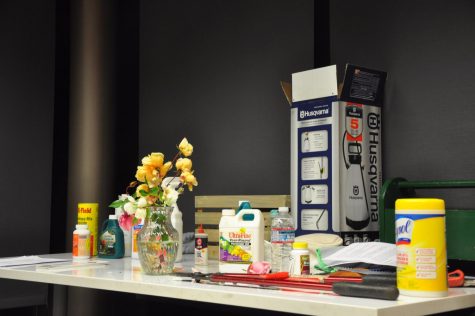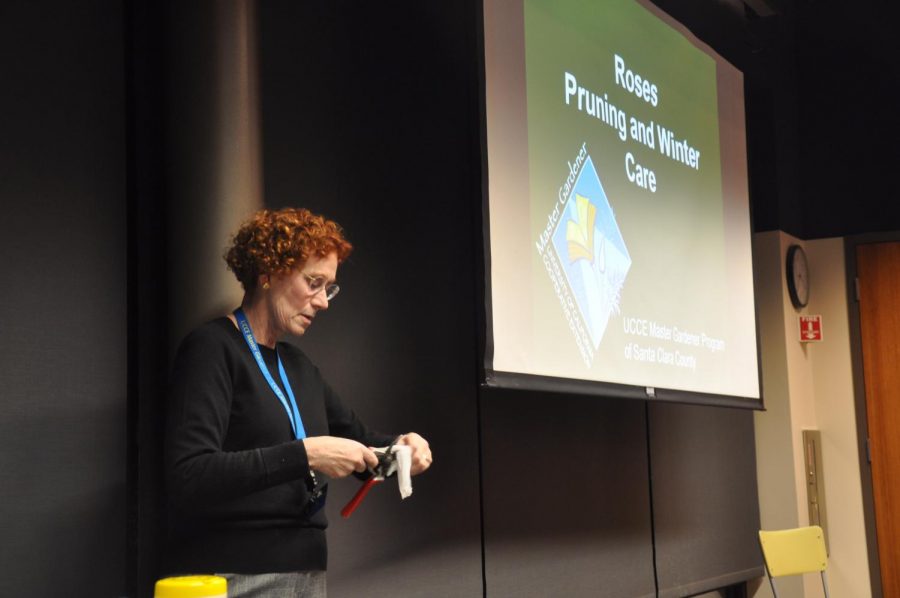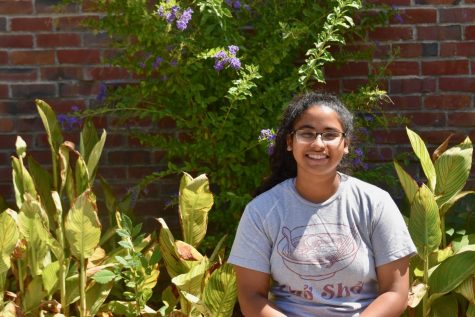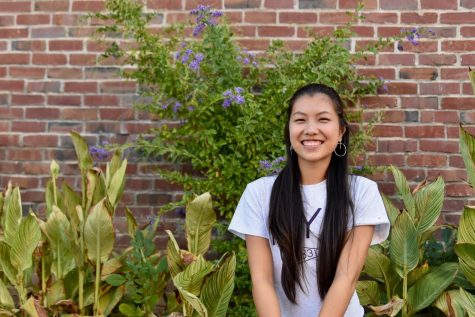Winter Care of Roses: Master Gardeners learn about rose care
Master Gardeners of Santa Clara County attend class in Cupertino Library
January 17, 2020
n a small room in the back of the Cupertino Library, a modest-sized audience watches intently as the speaker picks up a leafy rose stem and describes the process of rooting, in which rose stems are re-planted to grow new plants. The sound of notes being scribbled down on paper fills the room as she strategically prunes the stem to allow it to grow most effectively when rooted.
On Nov. 8, Master Gardener Paula Larkin-Hutton hosted a presentation on caring for roses from 7:00 to 9:30 p.m. Although it was open to the general public, many of the attendees were fellow Master Gardeners hoping to learn more about roses in particular.
According to Bonnie Wagner, Master Gardener of 10 years, the University of California Cooperative Extension (UCCE) educates a group of people from January through May about the science and art of gardening. After passing a test, they are proclaimed a Master Gardener if they have a minimum of 12 hours of educational classes and 25 volunteering hours. Wagner herself has over 1,000 volunteer hours and enjoys attending educational classes.
“Even though we are Master Gardeners and we know a lot of things, [we] don’t necessarily know every single thing and so I might go to several different talks because you learn, you add that little thing,” Wagner said. “So when you sit down through those classes you get that little nugget, that one little thing that [you] hadn’t thought about or you didn’t know about, and it sort of adds to your level of expertise.”

A table filled with rose care tools and sprays is set up in the corner of the room for demonstration purposes.
The event attracted other Santa Clara County Master Gardeners like Eugene Wong, a retired software engineer who turned his fascination for growing things into a hobby in 2015. As a Master Gardener of four years, Eugene has learned about scientific ways to grow plants and has shared his knowledge with those around him.
“I like to continue learning about all the different aspects of gardening,” Wong said. “I have some roses but I’m not an expert by any means. I always like to learn more about it. When I started learning about stuff, [I] picked up a gardening book, [and I] read they want you to prune your roses all the way down a couple inches off the ground. And we don’t need to do that in California. The weather’s so nice that it continues living quite well.”
While Wong specializes more in growing produce, Larkin-Hutton grows roses all around her house. Her love for roses stems from her father’s hobby of gardening and pruning these flowers. For her, gardening is both a science and an art.
“There’s science-based reasons for many of the things you do in a garden,” Larkin-Hutton said. “For example, I was talking about, you prune right above a bud eye, and that’s because the hormones in the plant come up to that point. They can’t go any further, and they tell that bud-eye to express itself in growth. So that’s science. But knowing which bud eye to prune it to has a lot to do with art. What kind of shape do you want it to be, what kind of form do you want it to have, what are you trying to do with this plant?”
Additionally, Larkin-Hutton finds that gardening is a meditative activity that allows her to clear her mind. Wagner agrees as she says working with live plants allows her to feel more lively.
“I think [gardening]’s got a wonderful feeling where you’re outside in the sun, in the breeze,” Wagner said. “You hear the birds chirping, you get your hands wearing gloves in the dirt and you have that connection to the earth.”
When Larkin-Hutton’s garden was most abundant, it contained over 150 roses, along with oak trees and other native plants that sprawled throughout her three acres of land. However, she’s had to cut down her garden to around 80 plants to make her garden more manageable and environmentally-friendly. Throughout her presentation, she not only explained the process behind rose pruning and care procedures, but she also stressed the importance of adapting to changes in climate, such as droughts or wildfires.
However, despite the difficulty in caring for a large garden and growing more traditional heirloom roses that require frequent attention, Larkin-Hutton maintains her fascination and love for them, which she expresses in her short presentations.
“I’m a very romantic person,” Larkin-Hutton said. “Romantic not in the sense of hearts and flowers, but in the older, 19th Century sense of romantic poetry and romantic emotions. I think the most beautiful phrase in the English language is ‘mysterious and beautiful.’ And I think a rose garden can be mysterious and beautiful.”



















